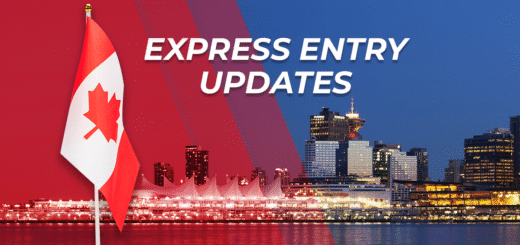Canada Student Visa: Relocate Abroad Through The Canada Student Visa Route, All You Need to Know

The Canada Student Visa has become highly sought after, and the idea of studying in Canada has become almost a global dream. Every year, thousands of students from different corners of the world pack their hopes, transcripts, and ambitions into one goal to secure a Canada Student Visa and begin a new chapter of their lives. Canada is not just another study destination. It is a country that combines high-quality education, real opportunities, and a sense of belonging that is hard to find elsewhere.
But before you get to the snow-covered campuses, late-night study sessions, and maple-flavored adventures, there is one big step you have to take: getting that Canada Student Visa.
This guide will walk you through everything, from why Canada draws so many international students to how the visa process works, what documents you will need, and what to watch out for along the way. Think of it less as a checklist and more as a roadmap, with each part helping you move closer to your goal.
Why So Many Students Choose Canada: The Appeal of a Canadian Education
It is not just about the beautiful cities or the friendly people. Canada has quietly built one of the most respected education systems in the world. Universities such as Toronto, McGill, and British Columbia consistently rank among the best globally. Beyond that, even the smaller colleges offer strong academic programs, practical training, and hands-on research opportunities.
The best part is that Canada manages to provide all this at a cost that is often lower than what you would pay in the United States, the United Kingdom, or Australia. That combination of quality and affordability makes it a smart investment for students who want value for money.
Work and Study Opportunities, A Welcoming and Diverse Society
Studying in Canada is not just about earning a degree. The country makes it possible to work while you study, which is a huge advantage. International students can take up part-time jobs during the semester and full-time jobs during holidays. For many, this helps cover living expenses and provides valuable Canadian work experience.
After graduation, there is the Post-Graduation Work Permit, a major opportunity that allows you to work in Canada for up to three years. That experience can later help you qualify for permanent residency through programs such as the Canadian Experience Class or the Provincial Nominee Program.
The environment is another major reason students are drawn to Canada. The country has built its identity around multiculturalism. You will meet people from every part of the world studying, working, and living together in the same communities. This openness creates a genuine sense of safety and acceptance. Many international students say that for the first time, they felt truly seen and supported far from home.
Canada Student Visa: Understanding the Types of Student Visas
Before applying, it helps to understand the kind of permission you need to study in Canada. The main document is the Study Permit. This is what allows you to study at any recognized Canadian institution, known as a Designated Learning Institution, or DLI.
Depending on your nationality, you might also need a Temporary Resident Visa or an Electronic Travel Authorization if your country is visa-exempt. But the core of your permission to study will always be the Study Permit.
What You Need to Qualify
Acceptance from a Designated Learning Institution
You must first receive an official acceptance letter from a Canadian institution recognized as a DLI. This letter is your entry ticket. It proves that a legitimate Canadian institution has offered you a spot. Without it, your application cannot move forward.
Proof of Financial Support
Canada wants to see that you can take care of yourself while you study. This means showing evidence of funds to cover tuition, accommodation, daily expenses, and travel costs. The general expectation is at least ten thousand Canadian dollars per year for living costs, on top of tuition fees.
You can prove this through bank statements, scholarship letters, or financial guarantees from a sponsor. Clear and authentic financial documentation is critical since this is one of the most carefully reviewed parts of the process.
Character and Health Requirements
Applicants must not have a criminal record or pose a security risk. This is usually confirmed through a police clearance certificate from your home country. Depending on where you are applying from and how long your study program lasts, you might also need a medical exam. Canada places great importance on health and security, so these checks cannot be skipped.
Proving Your Intent to Return Home
Another requirement is convincing the visa officer that you will leave Canada once your studies are complete. This does not mean you cannot later apply to stay, but your initial purpose must reflect a temporary stay. This is where your Statement of Purpose becomes powerful. It is your chance to explain who you are, why you chose your program, and how it connects to your long-term goals. A strong, honest statement helps the officer understand your story and trust your intentions.
Canada Student Visa: The Application Process Step by Step
Once you have your acceptance letter, it is time to put everything together. Start by organizing your documents: passport, proof of funds, photos, medical results, police certificate, and your Statement of Purpose. If any document is not in English or French, have it officially translated.
You can apply online through the Immigration, Refugees and Citizenship Canada portal, or submit your application through a Visa Application Centre in your country. The visa fee is one hundred and fifty Canadian dollars. After payment, you will likely need to provide biometrics such as fingerprints and a photo at an approved location.
Processing times vary depending on your country and the time of year. On average, it can take anywhere from four to twelve weeks. During busy seasons, it may take longer. This is why applying early is one of the smartest decisions you can make. Late applications are one of the easiest ways to derail your plans.
Financial Requirements Explained
Canada requires proof that you can support yourself during your studies. This includes tuition, living expenses, and extra funds if you are bringing family members. The standard estimate is ten thousand Canadian dollars a year outside Quebec.
It is not just about showing you have money. The funds must be clearly accessible and traceable. If your sponsor’s documents are inconsistent or your financial history does not match your claims, it can lead to rejection. Authenticity and clarity are what matter most here.
Canada Student Visa and the Common Reasons for Visa Refusal
Understanding why visas are denied can help you avoid the same mistakes.
Incomplete or incorrect documentation is one of the top reasons for rejection. A missing signature, an outdated form, or an unclear financial statement can create serious doubts.
Another frequent issue is weak financial proof. If the visa officer is not convinced that you can afford tuition and living expenses, your application may be denied.
Many students are also refused because they fail to show strong ties to their home country. You must demonstrate family, economic, or social reasons that would make you return home after your studies. Without this, the officer may assume you plan to stay in Canada illegally.
Finally, a vague or poorly written Statement of Purpose can damage your case. If your goals sound generic or disconnected, it becomes difficult for the officer to trust your motives. Your story must make sense from start to finish: why you chose Canada, your program, and how it fits into your future plans.
How to Improve Your Chances of Approval
The best applications are built on preparation and honesty. Start early so you have enough time to gather and review every document. Check that your acceptance letter, passport, test results, and financial proof are all up to date.
Spend time crafting a strong Statement of Purpose. This is your chance to explain your personal journey and academic motivation. Avoid copying online templates or vague phrases about global exposure. Instead, write about your background, your reasons for choosing your course, and what you plan to do after graduation. The more genuine your story, the stronger your application.
Always be consistent and truthful. Even small inconsistencies between your written forms and interview answers can raise doubts. If any part of the process feels overwhelming, consider seeking help from a licensed immigration consultant who understands the system.
What Happens After Approval?
Once your visa is approved, prepare all your documents before traveling: your passport, visa approval letter, proof of acceptance, and financial evidence. Canadian border officers may ask to see them when you arrive.
When you finally enter Canada, your Study Permit becomes your key to begin studying and working. You are allowed to work up to twenty hours per week during school sessions and full-time during breaks. This not only helps with expenses but also gives you real experience in the Canadian job market. Many students find that working helps them adapt to local culture and build valuable skills.
Opportunities After Graduation
Graduating from a Canadian institution often opens more doors than you expect. Through the Post Graduation Work Permit, you can work in Canada for up to three years. This period allows you to gain meaningful experience, build networks, and potentially qualify for permanent residency.
Programs such as Express Entry and the Provincial Nominee Program favor applicants who already have Canadian education and work experience. That means your journey does not necessarily end with your degree. For many, the student visa becomes the foundation for a long-term future in Canada.
Final Thoughts
The Canadian Student Visa is not just a permit to study. It is the beginning of an entirely new chapter filled with learning, growth, and opportunity. Every step of the process, from gathering documents to writing your Statement of Purpose, is part of your investment in that future.
Canada offers more than academic excellence. It offers a society that values diversity, fairness, and opportunity. Whether you return home after graduation or decide to build a career in Canada, the experience will shape your life in ways you cannot predict now.
So take your time, plan carefully, and approach the application with patience and attention to detail. Each document, form, and decision brings you closer to sitting in a Canadian classroom surrounded by people who share your drive and curiosity.
Your Canadian dream is within reach. The student visa is simply the first step toward making it real.













